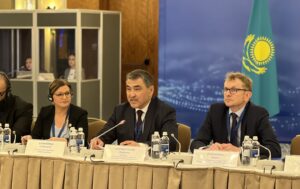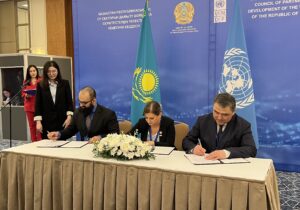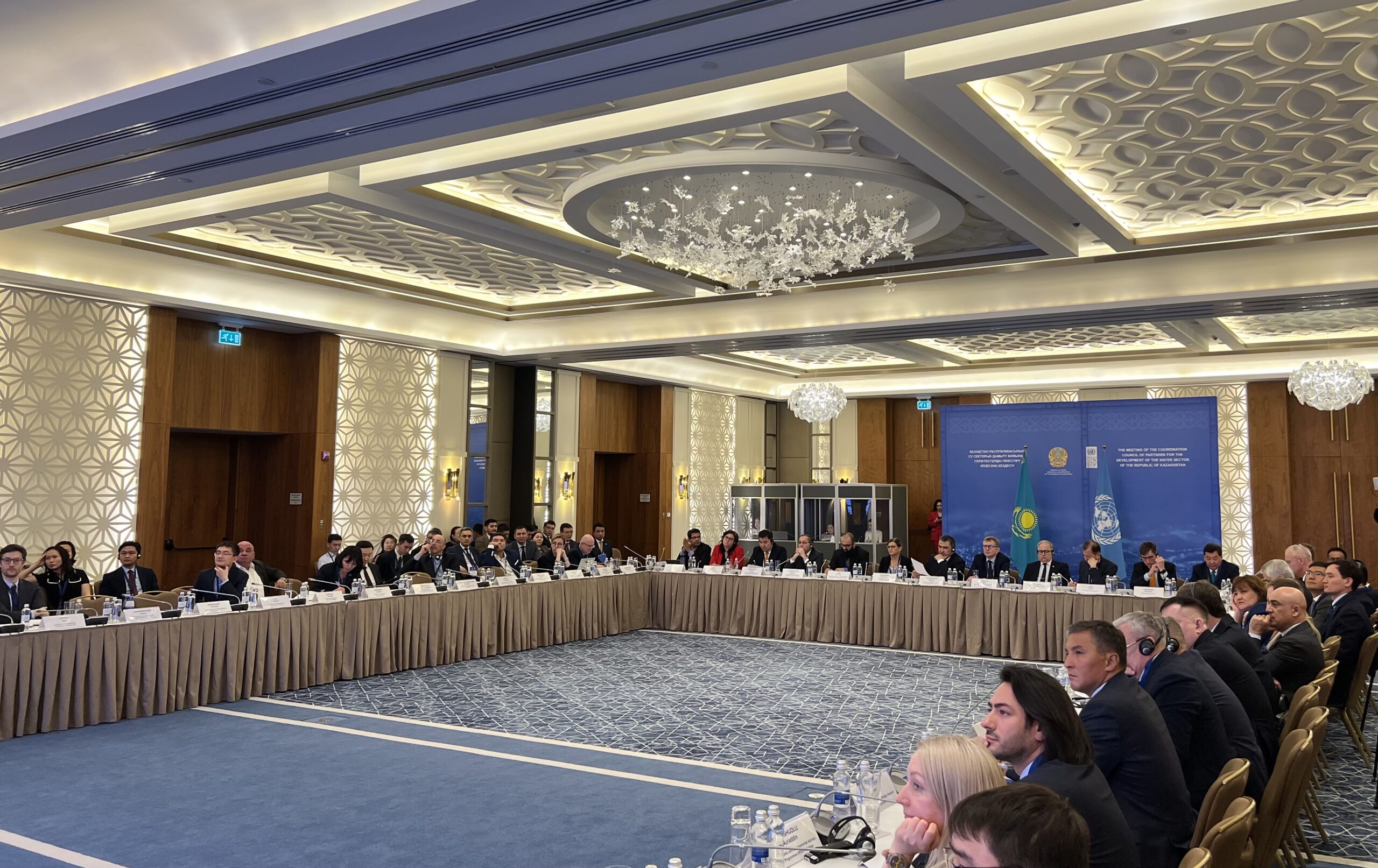ASTANA — The second meeting of the coordination council for the development of Kazakhstan’s water sector on April 10 highlighted key advancements in sustainable water management.

The second meeting of the coordination council for the development of Kazakhstan’s water sector on April 10. Photo credit: Nagima Abuova / The Astana Times
The meeting, chaired by Kazakh Minister of Water Resources and Irrigation Nurzhan Nurzhigitov and United Nations Development Programme (UNDP) Resident Representative Katarzyna Wawiernia, focused on the country’s water challenges and reinforced international cooperation to address them.
Strengthening strategic partnerships for water security

From left to right: Katarzyna Wawiernia, Nurzhan Nurzhigitov, and Johannes Baur, head of cooperation at the EU Delegation to Kazakhstan. Photo credit: Nagima Abuova / The Astana Times
The meeting of the coordination council, which currently includes 35 partner organizations, gathered representatives from international organizations, financial institutions, and diplomatic missions to discuss the future priorities for Kazakhstan’s water sector. A key focus was the Partnership Water Initiative for 2024–2030, which was launched in September 2024. This initiative aims to modernize Kazakhstan’s water infrastructure and enhance the efficiency of its water management practices.
The event also hosted discussions on water security, the preservation of Balkhash Lake, and attracting investment for water infrastructure development.
Minister Nurzhigitov highlighted the council’s success in fostering collaborations between the public, private and international sectors.
“In just six months, we have reached concrete agreements and launched new projects with partner countries, development institutions, financial organizations, and major companies,” he said.
He noted that the ministry has signed three agreements and 16 memorandums with international partners, including countries such as the Netherlands, France, Germany, Spain, the United States, Israel, and China, as well as organizations such as the Islamic Development Bank (IDB), the Eurasian Development Bank (EDB), the International Bank for Reconstruction and Development (IBRD) and UNDP.
“We are at a key stage in the reform and development of Kazakhstan’s water sector. (…) We are implementing a large-scale transformation of water management in the industry, focusing on management projects such as the comprehensive modernization of water infrastructure, the introduction of digital technologies and water-saving solutions, the formation of an effective policy and strengthening cross-border cooperation with neighboring countries,” said Nurzhigitov.
Progress amid challenges
Wawiernia highlighted significant progress in the development of a water sector partnership in Kazakhstan.

From left to right: Ali M. Khan, head of the IDB regional representative office in Almaty, Katarzyna Wawiernia, Nurzhan Nurzhigitov. Photo credit: Nagima Abuova / The Astana Times
“It’s encouraging to see how in just a few months, this Council has evolved from a concept into a functioning platform with real results. Thanks to this platform, a broad range of national and international actors have come together to support Kazakhstan’s water sector priorities. We are now seeing the implementation of new initiatives and partnerships aimed at increasing the resilience of Kazakhstan’s water sector,” said Wawiernia.
Wawiernia also highlighted the challenges Kazakhstan has faced, particularly the devastating floods of 2024, which affected hundreds of thousands of people and put additional pressure on already vulnerable water systems and ecosystems. She noted that despite the scale of the crisis, Kazakhstan’s government responded decisively, leveraging its own institutional capacities.
“But that doesn’t mean that Kazakhstan should bear the burden alone. In moments like this, international solidarity and technical cooperation matter. In this spirit, UNDP, using its full resources, was also there to support the government in providing targeted technical expertise and to help lay the groundwork for long-term systemic solutions in flood forecasting and risk management,” said Wawiernia.
International cooperation: key investments and projects
Vice Minister of Water Resources and Irrigation Nurlan Aldamzharov highlighted the impact of international partnerships, particularly in funding Kazakhstan’s water sector projects.
“In the first phase, the investment [from Islamic Development Bank] in the climate-resilient water resources development project amounts to $1.15 million. The project includes the construction of four new reservoirs and the reconstruction of four existing ones, as well as the renovation and repairs of 115 canals, including the project to replenish the Astana reservoir,” said Aldamzharov.
He also mentioned the launch of a project supported by the Japanese government in March. This project aims to create an automated reporting system for hydraulic structures and develop monitoring and disaster warning standards, particularly focusing on dam breaches and flood preparedness.
A 1.35 million euro (US$1.53 million) grant from the French Development Agency (AFD) will also contribute to a master plan for the preservation of Lake Balkhash.
Aldamzharov outlined the international collaborative efforts with the Netherlands, Germany and China. This includes the training sessions on flood risk management conducted by Dutch experts from the Institute for Water Education, advanced training of specialists in Kazakhstan’s water sector, organized with the support of Chinese Ministry of Commerce and logistical support, automation of cross-border canals and the establishment of an information and analytical center by German Society for International Cooperation (GIZ).
Addressing flood risks and building resilience
Hubert Lohr, the UNDP international advisor to Kazakhstan’s Ministry of Water Resources and Irrigation, reflected on the severe floods of the previous year. He noted that, while the impact was devastating, the country is now better prepared for future flood risks.

Hubert Lohr, the UNDP international advisor to Kazakhstan’s Ministry of Water Resources and Irrigation. Photo credit: Nagima Abuova / The Astana Times
“The fact that we can convene today, the second Water Council meeting is a sign that the flood season in 2025 is very different to last year. There are problems at some locations and that always happens, but in general, we can say the situation is containable,” he said.
Lohr also provided an update on key initiatives, including smart irrigation and transboundary water cooperation. Notably, the partnership initiative, which was initiated to coordinate activities with partners, develop proposals, align them with the ministry’s actual needs and provide technical advisory support, has produced flood hazard, risk, and damage maps.
“What is it [the map] good for? First of all, results can be added to the flood early warning system, and second, most importantly, the methodology can be scaled up to other locations, which means we now have the means to address cost benefit analysis related to flood mitigation measures,” said Lohr.
New cooperation agreements and strategic goals
The meeting also featured a signing ceremony for several key cooperation agreements.
The ministry signed a communiqué with the Spanish company Xcalibur Smart Mapping to map underground water resources in western Kazakhstan. The document outlines mutual commitments to conduct studies to ensure the sustainable use of the country’s groundwater.
The ministry, the IDB, and UNDP signed a statement of intent to jointly strengthen the technical capacity of Kazakhstan’s water sector, advance digitalization, improve flood forecasting systems and climate resilience, and develop water policy.

The coordination council meeting brought together representatives from international organizations, financial institutions, and diplomatic missions to discuss Kazakhstan’s water sector priorities. Photo credit: Nagima Abuova / The Astana Times
The Information and Analytical Center for Water Resources and the EDB signed an agreement to provide a grant for the creation of a National Water Resources Information System, to be completed by 2026. The project aims to enhance transparency, efficiency and equitable distribution of Kazakhstan’s water resources.
The Kazvodkhoz enterprise and China’s PowerChina International signed a communiqué on ongoing and expanded cooperation, including training seminars in China for Kazakhstan’s water sector specialists. The first group of 30 participants has begun a two-week training program in China.
Kazvodkhoz also signed a memorandum of cooperation with Primus Capital Almaty, focusing on the development of small hydropower plants at its facilities.
